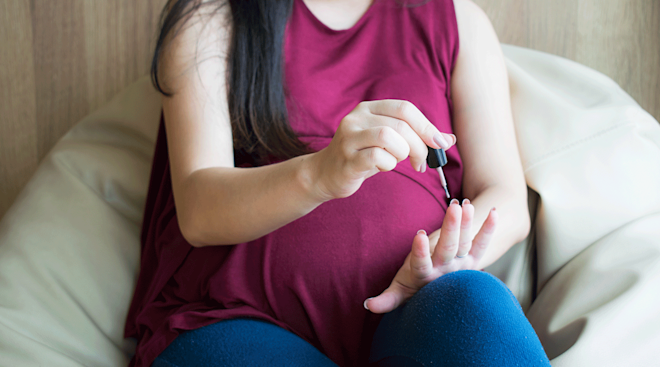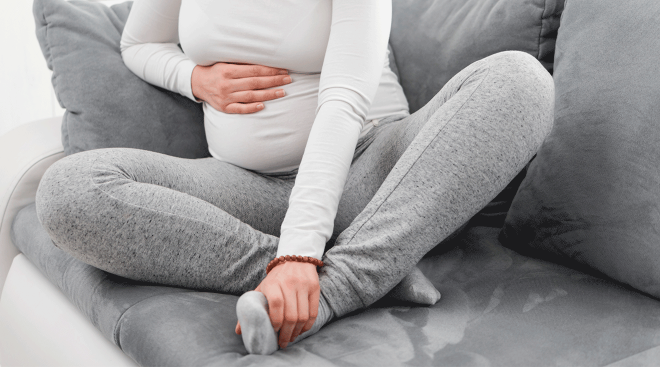Top Pregnancy Fears: When to Worry and When to Let Go
Pregnancy brings on a roller-coaster of intense emotions: sheer joy, mostly—but also sheer fear. There’s the stress of planning, the crazy body changes, the endless list of dos and dont’s—and, oh yeah, the fact that you’re growing a tiny human inside of you. “Being pregnant is obviously a high-stakes endeavor, and it’s pretty typical to be worried that something could go wrong,” says Emily Cohen-Moreira, a certified cooperative childbirth educator and doula in New York City. But while some fears may be warranted, others simply are not. Here, experts and real moms alike break down some common pregnancy fears—and offer advice on how to put these “what ifs” into perspective.
I had a couple of miscarriages before my rainbow baby was born, so I had anxiety throughout my pregnancy. I tried my best to relax, but it was difficult. When I could feel him moving around that helped calm my fears a bit.
Miscarriage is among the top fears women have surrounding pregnancy. It can be hard to handle the all-too-real anxiety around experiencing a potential loss. But it’s important to arm yourself with the facts. An estimated 1 in 10 clinically recognized pregnancies end in early loss, with about 80 percent happening during the first 12 weeks, says Rebecca Dekker, PhD, RN, a registered nurse and founder of Evidence Based Birth. By the second trimester, that risk drops to less than 1 percent.
As hard as it is, the fear of miscarriage is one to accept and then let go of. “Your concern is a natural part of being human, and it’s okay to be worried,” says Fahimeh Sasan, MD, an ob-gyn and founder of Kindbody, which offers holistic fertility, gynecology and wellness care. “It’s not something you can control or prevent.” Rather than stressing over possibilities beyond your control, focus your efforts instead on doing things to boost your health and baby’s health, such as starting an exercise regimen and eating a nutritious diet.
With all the “eat this, not that” advice you get during pregnancy, it’s easy to obsess about every little thing on your plate. “Obviously it’s important to follow the guidelines on what to eat and drink during pregnancy, but also remember those lists are made out of an abundance of caution,” says Cohen-Moreira. “Women can get overly invested in making sure they’re doing everything perfectly, when it’s really unlikely that a mistake would result in anything harmful to baby.”
Most warnings came about to help ward off food poisoning, which can cause serious complications during pregnancy. One of the biggest fears is listeriosis, a bacterial infection you can get from eating contaminated cold cuts and hot dogs—but thankfully that type of infection is extremely rare, Dekker says.
Of course, you should still avoid problematic foods, including alcohol, raw meat, raw seafood and unpasteurized milk and cheese. But rest assured that if you do inadvertently bite into a slice of unpasteurized brie in your salad, you’ll likely have nothing to worry about.
With how complex pregnancy and childbirth can be, it’s understandable to be anxious about the risk of complications. Per Cleveland Clinic, some of the most common ones for Mom and baby include hyperemesis gravidarum, congenital disorders, preeclampsia, placenta previa and more. But it’s important to know that everyone’s risk factors for these complications will vary—and they may depend on your pre-pregnancy health.
If you do find yourself with a potential complication, Lisa Jackson, MD, FACOG, an ob-gyn and partner at Uptown OBGYN of New York, advises to absorb as much information as you can from your providers, then go home and digest the news. Once you’ve done that, list out any questions or concerns and go back to your providers to discuss. “Understanding what the finding is and what it means for you and baby is important to decreasing anxiety,” Jackson notes. “Your doctor will also have resources for you to speak with a specialist, or a therapist if your anxiety is worsening regarding the complication that you’re facing.” Take heart in knowing that with modern medicine there are tons of resources available to help increase the health of you and baby, despite any pregnancy complications.
I was always afraid I was going to somehow roll onto my stomach while I was sleeping and crush the baby! It makes me laugh now. It was almost impossible for me to move—I was so big, so the idea of rolling onto my stomach while I slept is pretty hilarious. — Heather S., mom of three and blogger behind The Spohrs Are Multiplying
Accidentally hurting baby is another common pregnancy fear many expectant parents face. Pregnant women are repeatedly told to avoid laying on their back—especially after the 20-week mark—as it could disrupt blood flow to baby. So, if you’re used to sleeping on your back or belly, it’s understandable you’d worry about rolling back to that position in the middle of the night. But the truth is, you can relax—your body naturally protects your growing baby.
In the early stages of pregnancy, it’s actually safe to sleep on your stomach, says Ashley Roman, MD, an ob-gyn and maternal fetal medicine specialist at NYU Langone in New York City. Once your belly (and baby!) starts to grow, it won’t be comfortable, or even possible, to lie for long periods on your stomach anyway—so chances are, you’ll change positions in your sleep long before you could do any harm to baby. As for sleeping on your back, if you do wake up in that position, again, odds are you haven’t been there for long. Per Stanford Medicine sleeping on your back, particularly in the third trimester, can cause increased pressure and discomfort, making it unlikely that you’d stay in that sleeping position for more than a few minutes.
Every time I would laugh, sneeze, cough—or God forbid do any of the above while walking or moving around—my bladder would let me down. I wore very long shirts in case it ever soaked through. – Erica B., mom of of two and blogger behind Sweet Leigh Mama
We’re not going to lie here—leakage mishaps can and probably will happen. When you’re creeping into the later stages of pregnancy, sudden laughter, sneezing or coughing are basically sure-fire ways to bring on a surprise dribble. While it’s unlikely you’ll leak enough for anyone to notice, there is a simple solution. Go to the bathroom regularly, even every one to two hours, advises Sasan. “If you keep your bladder empty, it becomes less likely that you’ll leak.” In any case, it’s not worth stressing over. All moms have been there! (And, BTW, as far as post-birth bladder control goes, kegels are your friend.)
Preterm labor affects about 1 in 10 pregnancies in the United States, according to the Centers for Disease Control and Prevention (CDC). So the risk is real, and it’s higher if you smoke, suffer from an infection, are carrying multiples or have experienced preterm birth in a previous pregnancy. Doctors often don’t know exactly why preterm labor happens, says Dekker—but they do know that preterm labor doesn’t always end in preterm birth. According to the American College of Obstetricians and Gynecologists (ACOG), about 3 in 10 cases of preterm labor stop on their own and, if not, certain treatments can help prolong your pregnancy or prepare baby for delivery. Contact your doctor right away if you think you’re going into early labor.
With my first, my water did break spontaneously. Fortunately, it was more of a questionable trickle than an overwhelming gush. Well, at first, at least! Once I got myself to the bathroom, the flood gates opened. In other words, there was a bit of a warning so I wasn't completely caught off guard.
Contrary to what you see in the movies, labor doesn’t usually begin this way. Fewer than 15 percent of women have their water break before labor contractions start, the experts note. In other words, it’s unlikely that the rupturing of the amniotic sac would be your first indication of labor. And even if it is, it probably won’t be the sudden deluge they show on television, but rather “a gentle trickle that keeps going,” Sasan says. “If it does break in public, you’ll very likely be the only person to know it.”
Again, don’t believe everything you see in pop culture, as not making it to the hospital in time for birth is a pretty rare occurrence. “Most women who are having their first baby will have a long enough labor to get to the hospital,” Jackson explains. What’s more, long before the big day, your provider will review all the signs to look for that indicate labor is starting so you know exactly when to call your birth center or hospital. They’ll “take into account a number of factors when they give you labor instructions,” Jackson adds. These include your personal medical history, labor processes in place at the hospital and more. Plus, consider other logistical factors ahead of time, such as any traffic you might hit on the way and childcare for any older kiddos. Arming yourself with knowledge and making a game plan ahead of time can really help allay any fears of not making it to your birthing place in time.
In the very small offchance that you do experience an incredibly fast labor, Jackson notes help is always only a phone call away—“and you’ll have a great story to tell” for years to come.
You may not want to hear this, but pooping and vomiting during labor is actually pretty common and normal. “Your body is undergoing many changes during labor…Healthcare providers are used to these changes and all that comes with it,” Jackson says. In fact, vomiting during labor is associated with progression of active labor, so most providers view it as a good thing. As for concerns over pooping while pushing baby out—“this means you’re doing it the right way,” Jackson says. “Trying to keep yourself from pooping, may inhibit your progress with pushing, so please—don’t hold back!” It may seem mortifying, but both are a natural part of the childbirth process, and your birth team is very used to it.
This is another big fear many pregnant women have, but remember, a birth plan needs to be flexible to be effective. “It’s not a to-do list where you check off things that you want to accomplish… Labor and delivery are unpredictable processes,” Jackson says. “If you’ve never been in labor before, it’s impossible to know how painful your labor will be or how long it’ll last, and these things will contribute to whether you’ll want to get an epidural or not.” Instead, use your birth plan as an opportunity to discuss how you can prepare for some of the unexpected situations that could come into play based on your circumstances. Regardless of how you get there, stay focused on the end goal: a healthy mom and baby.
While the newborn stage is hectic and exhausting, it probably won’t take you long to get the hang of things. “It’s definitely good to do some prenatal education in how to care for and handle a baby, but obviously you’ll learn most of it once baby arrives,” says Cohen-Moreira. “All new parents will have lots of opportunities to practice.” Most parents will admit to hilarious errors they made during the newborn stage, but will also say they figured it out pretty quickly. And don’t discount your natural instincts, which kick into high gear after baby’s arrival. Even if you’ve never laid eyes on a diaper and haven’t a clue about swaddling, don’t worry—it’s not rocket science, and you’ll get there soon enough.
The fear of hurting baby extends to after birth, once they’re outside the womb. Newborns and babies are tiny and fragile, so it makes sense that many new parents worry about accidentally hurting their little one or not knowing how to hold them correctly. But babies are more resilient than you might think, Jackson says. Plus, you’ll get some training from postpartum nurses at the hospital after birth. “They’re great at easing new parents into their role and demonstrating how to hold a newborn,” Jackson says, adding that taking classes on how to handle a newborn before they arrive may also help quell some anxiety.
There’s no sugarcoating it: Regardless of how you gave birth, your body changes during pregnancy. While it’ll be pretty close to its pre-pregnancy self after recovery, it’ll never be exactly the same as it was. “Breastfeeding can also cause a delay in the return to normal vaginal tissue because it puts you in a hypo-estrogenic state, causing vaginal dryness,” Jackson says. But change, while difficult to accept at times, doesn’t necessarily mean your sex life will never be the same. The key to getting back to your sense of self and intimacy is to use all resources to help your body’s recovery as needed, including pelvic floor physical therapy, medications to combat vaginal dryness and more. “There are many tools to help women get back to a normal, healthy sex life,” Jackson says. “Appreciation for what your body is capable of doing—growing and delivering a human—may aid in your confidence in the bedroom as well.”
The reality is that the becoming a parent is life-changing. “You won’t be the same person as you were before this little person entered your life…it’s impossible,” Jackson says. Instead of feeling anxious about losing yourself, embrace this new version and know that eventually you’ll start to find your way back to a version of yourself that feels right. Of course, if you’re dealing with any scary changes after birth, such as increased anxiety, postpartum depression or a difficult postpartum recovery, don’t hesitate to ask your provider for help.
“Every new experience in life alters who you are, and childbirth is the ultimate experience,” Jackson says. “Having a child is an exciting and joyful event that can throw life upside down as you know it. Families often discover a resilience and strength they didn’t know existed.” Plus, there are resources available to support you as you start this next chapter. “You’re not going through this alone, so don’t be afraid to discuss what you’re experiencing openly with your provider,” Jackson adds.
Please note: The Bump and the materials and information it contains are not intended to, and do not constitute, medical or other health advice or diagnosis and should not be used as such. You should always consult with a qualified physician or health professional about your specific circumstances.
Plus, more from The Bump:
Emily Cohen-Moreira is a certified cooperative childbirth educator, doula and lactation consultant in New York City. She founded her prenatal education service, Practical Birth and Breastfeeding to provide individualized education and support for expectant and new families. She provides education on childbirth, breastfeeding and newborn care, supports laboring women as a birth doula, assists in home births and provides postpartum lactation support.
Rebecca Dekker, PhD, RN, is a registered nurse and founder of Evidence Based Birth, whose mission is to raise the quality of childbirth care globally by putting accurate, evidence-based research into the hands of families and communities so they can make informed, empowered choices. Dekker is also the author of Babies Are Not Pizzas: They’re Born, Not Delivered!.
Lisa Jackson, MD, FACOG, is an ob-gyn with over 15 years of experience and a partner at Uptown OBGYN of New York. She earned her medical degree from Vanderbilt University School of Medicine in Nashville, Tennessee and completed her residency in Chicago at Rush University Medical Center. She also serves as an assistant clinical professor of ob-gyn at the Mount Sinai Hospital in New York City.
Ashley Roman, MD, is a double board certified ob-gyn and maternal fetal medicine specialist at NYU Langone in New York City. She earned her medical degree from Tulane University in 1998.
Fahimeh Sasan, MD, is a New York City-based ob-gyn and founder of Kindbody, a modern women's fertility and wellness company. She has been in clinical practice for more than 12 years.
Cleveland Clinic, Pregnancy Complications, November 2022
Stanford Medicine, Sleeping Positions During Pregnancy
Centers for Disease Control and Prevention, Preterm Birth, November 2024
American College of Obstetricians and Gynecologists, Preterm Labor and Birth, April 2023
Learn how we ensure the accuracy of our content through our editorial and medical review process.
Navigate forward to interact with the calendar and select a date. Press the question mark key to get the keyboard shortcuts for changing dates.




















































